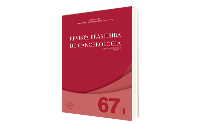Effect of Nutritional Supplement Enriched with Eicosapentaenoic Acid in Lean Mass of Subjects with Oral Cavity Cancer in Oncologic Pretreatment: a Clinical Trial
DOI:
https://doi.org/10.32635/2176-9745.RBC.2021v67n1.868Keywords:
Neoplasms/drug therapy, Dietary Supplements, Eicosapentaenoic Acid/administration & dosage, Body Composition/drug effects, Nutritional StatusAbstract
Introduction: Oral cavity cancer is considered a public health problem worldwide. Malnutrition is prevalent in this population, increasing morbidity and mortality. Supplementation with eicosapentaenoic acid has been proposed to reverse protein catabolism and modulate inflammatory processes. Objective: Assess the effect of supplement with eicosapentaenoic acid in the weight and lean mass of patients with oral cavity cancer. Method: Clinical trial conducted with patients in oncologic pretreatment. The patients were randomized to receive nutritional supplement with eicosapentaenoic acid (2 g/day) or placebo. Nutritional parameters (weight, height, body composition and food intake) were assessed at baseline (T0) and after 4 weeks of supplementation (T1). The paired t-test or Wilcoxon test were used in intragroup comparisons. Associations between categorical variables were verified using the χ² or Fisher Exact test. Logistic regression was applied to identify the chance of weight loss. Differences were considered significant at p <0.05. Results: It was not observed significant difference on nutritional parameters between the groups after intervention. However, considering each group at the beginning and at the end of the study, it was observed that patients in the control group presented significant weight loss (T0: 57.2 kg x T1: 56.4 kg), reduction in the body mass index (T0: 22.6 kg/m2 x T1: 22.0 kg/m2), fat mass (T0: 17.3 kg x T1: 15.3 kg) and arm circumference (T0: 27.4 cm x T1: 26.8 cm). Those who received supplement with eicosapentaenoic acid had 80% less chance of losing weight (95% CI: 0.045-0.860; OR: 0.19). Conclusion: This trial yielded data suggesting that patients with oral cavity cancer can benefit from eicosapentaenoic acid-containing nutritional supplement in oncologic pretreatment. Registration number: U1111-1177-3678.
Downloads
Downloads
Published
How to Cite
Issue
Section
License
Os direitos morais e intelectuais dos artigos pertencem aos respectivos autores, que concedem à RBC o direito de publicação.

This work is licensed under a Creative Commons Attribution 4.0 International License.









